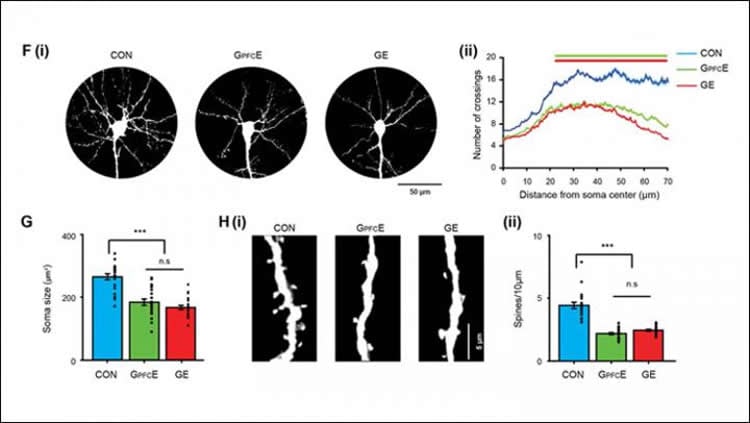Summary: Researchers report abnormal development of the prefrontal cortex and maternal stress may lead to brain activity and cognitive impairments linked to psychiatric diseases such as Schizophrenia and bipolar disorder.
Source: SfN.
Faulty wiring of the prefrontal cortex during development leads to abnormal brain activity and cognitive impairments related to mental illness, according to a mouse study published in Journal of Neuroscience.
Eliminating a molecule called Disrupted-in-Schizophrenia 1 (DISC1) from the entire brain has been previously shown to alter connectivity between the prefrontal cortex and the hippocampus and impair the cognitive abilities this circuit supports in mice exposed to an environmental stressor.
Ileana Hanganu-Opatz and colleagues now show similar deficits arise from disrupting DISC1 in a specific group of prefrontal cortex neurons in mouse embryos whose mothers were infected with a virus.

These findings uncover a mechanism by which abnormal development of the prefrontal cortex and maternal stress interact to produce brain and behavior impairments reminiscent of schizophrenia, bipolar, and depressive disorders.
Funding: European Research Council, German Research Foundation funded this study.
Source: David Barnstone – SfN
Publisher: Organized by NeuroscienceNews.com.
Image Source: NeuroscienceNews.com image is credited to Xu et al., JNeurosci (2019).
Original Research: Abstract for “Transient knock-down of prefrontal DISC1 in immune-challenged mice causes abnormal long-range coupling and cognitive dysfunction throughout development” by Xiaxia Xu, Mattia Chini, Sebastian H. Bitzenhofer and Ileana L. Hanganu-Opatz in Journal of Neuroscience. Published January 7 2019.
doi:10.1523/JNEUROSCI.2170-18.2018
[cbtabs][cbtab title=”MLA”]SfN”Maternal Stress and Abnormal Brain Development May Interact to Produce Mental Illnesses.” NeuroscienceNews. NeuroscienceNews, 7 January 2019.
<https://neurosciencenews.com/brain-development-stress-mental-health-10440/>.[/cbtab][cbtab title=”APA”]SfN(2019, January 7). Maternal Stress and Abnormal Brain Development May Interact to Produce Mental Illnesses. NeuroscienceNews. Retrieved January 7, 2019 from https://neurosciencenews.com/brain-development-stress-mental-health-10440/[/cbtab][cbtab title=”Chicago”]SfN”Maternal Stress and Abnormal Brain Development May Interact to Produce Mental Illnesses.” https://neurosciencenews.com/brain-development-stress-mental-health-10440/ (accessed January 7, 2019).[/cbtab][/cbtabs]
Abstract
Transient knock-down of prefrontal DISC1 in immune-challenged mice causes abnormal long-range coupling and cognitive dysfunction throughout developments
Compromised brain development has been hypothesized to account for mental illness. This concept was underpinned by the function of the molecule Disrupted-in-Schizophrenia 1 (DISC1) that represents an intracellular hub of developmental processes and has been related to cognitive dysfunction in psychiatric disorders. Mice with whole-brain DISC1 knock-down show impaired prefrontal-hippocampal function and cognitive abilities throughout development and at adulthood, especially when combined with early environmental stressors, such as maternal immune activation (MIA). However, the contribution of abnormal DISC1-driven maturation of either prefrontal cortex (PFC) or hippocampus (HP) to these deficits is still unknown. Here, we use in utero electroporation to restrict the DISC1 knock-down to prefrontal layer II/III pyramidal neurons during perinatal development and expose these mice to MIA as an environmental stressor (dual-hit GPFCE mice, both sexes). Combining in vivo electrophysiology and neuroanatomy with behavioral testing, we show that GPFCE mice at neonatal age have abnormal patterns of oscillatory activity and firing in PFC, but not HP. Abnormal firing rates in PFC of GPFCE mice relate to sparser dendritic arborization and lower spine density. Moreover, the long-range coupling within prefrontal-hippocampal networks is decreased at this age. The transient prefrontal DISC1 knock-down was sufficient to permanently perturb the prefrontal-hippocampal communication and caused poorer recognition memory performance at pre-juvenile age. Thus, developmental dysfunction of prefrontal circuitry causes long-lasting disturbances related to mental illness.
SIGNIFICANCE STATEMENT
Hypofrontality is considered a main cause of cognitive deficits in mental disorders, yet the underlying mechanisms are still largely unknown. During development, long before the emergence of disease symptoms, the functional coupling within the prefrontal-hippocampal network, which is the core brain circuit involved in cognitive processing, is reduced. To assess to which extent impaired prefrontal development contributes to the early dysfunction, immune-challenged mice with transient DISC1 knock-down confined to PFC were investigated in their prefrontal-hippocampal communication throughout development by in vivo electrophysiology and behavioral testing. We show that perturbing developmental processes of prefrontal layer II/III pyramidal neurons is sufficient to diminish prefrontal-hippocampal coupling and decrease the cognitive performance throughout development.







